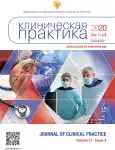The influence of model iterative reconstruction on the image quality in standard and low-dose computer tomography of the chest. Experimental study
- Authors: Silin А.Y.1,2, Gruzdev I.S.2, Morozov S.P.3
-
Affiliations:
- Clinical Hospital on Yauza
- Research and Practical Clinical Center for Diagnostics and Telemedicine Technologies of Moscow Health Care Departmen
- A.V. Vishnevsky National Medical Research Center of Surgery
- Issue: Vol 11, No 4 (2020)
- Pages: 49-54
- Section: Original Study Articles
- URL: https://journal-vniispk.ru/clinpractice/article/view/34900
- DOI: https://doi.org/10.17816/clinpract34900
- ID: 34900
Cite item
Full Text
Abstract
Background. One of the ways to reduce the radiation dose in CT is to the image reconstruction algorithms. The latest offer from CT scanner manufacturers is Model Iterative Reconstruction (MIR). Aims: to compare the quality of visualization of the structures of the chest organs and to prove the effectiveness of the low-dose protocol with iterative model reconstruction. Methods. A calibration phantom with a spatial resolution module and an anthropomorphic phantom of the upper body of an adult with nodules in the lungs were scanned using two CT scanners of different manufacturers. Two protocols were applied: the standard dose protocol (SDCT) with the algorithms of hybrid iterative reconstruction (HIR) of images and MIR and a low-dose protocol (LDCT) with the MIRalgorithm. The quality of the obtained images was evaluated by the following parameters: noise (SD), the contrast-to-noise ratio (CNR), spatial resolution and visualization of pulmonary nodules. The radiation dose was calculated according to the scanner data, the data of individual dosimeters placed on the anthropomorphic phantom, and using a dosimetric phantom. Results. The average SD was 11.5; 24.4 and 21.6; CNR 85.47; 40.6 and 45.6; spatial resolution 2 mm; 2 mm and 3 mm for SDCT with MIR, SDCT with HIR and LDCT with MIR respectively. Visualization of the pulmonary lesions remained excellent in all cases. The radiation dose in case of SDCT was 2.7, and in case of LDCT — 0.67 mSv. The dose reduction was confirmed by the dosimeter data. Similar results were obtained by repeating the experiment with a second scanner. Conclusions. The model iterative reconstruction application will allow reducing the irradiatin dose during CT scanning of the chest organs without deterioration of the visualization quality.
Full Text
##article.viewOnOriginalSite##About the authors
Антон Yu. Silin
Clinical Hospital on Yauza; Research and Practical Clinical Center for Diagnostics and Telemedicine Technologies of Moscow Health Care Departmen
Email: silin@yamed.ru
ORCID iD: 0000-0003-4952-2347
SPIN-code: 4411-8745
Radiologist of the Highest Qualification Category, Junior Researcher
Russian Federation, MoscowIvan S. Gruzdev
Research and Practical Clinical Center for Diagnostics and Telemedicine Technologies of Moscow Health Care Departmen
Author for correspondence.
Email: gruzdev_van@mail.ru
ORCID iD: 0000-0003-0781-9898
SPIN-code: 3350-0832
graduate student
Russian Federation, MoscowSergey P. Morozov
A.V. Vishnevsky National Medical Research Center of Surgery
Email: npcmr@zdrav.mos.ru
ORCID iD: 0000-0001-6545-6170
SPIN-code: 8542-1720
MD, PhD, Professor
Russian Federation, MoscowReferences
- McCunney RJ, Li J. Radiation risks in lung cancer screening programs: a comparison with nuclear industry workers and atomic bomb survivors. Chest. 2014;145(3):618–624. doi: 10.1378/chest.13-1420.
- Mehta D, Thompson R, Morton T, et al. Iterative model reconstruction: simultaneously lowered computed tomography radiation dose and improved image quality. Med Phys Int J. 2013;2(1):147–155.
- Yan C, Xu J, Liang C, et al. Radiation dose reduction by using ct with iterative model reconstruction in patients with pulmonary invasive fungal infection. Radiology. 2018;288(1):285–292. doi: 10.1148/radiol.2018172107.
- Katsura M, Sato J, Akahane M, et al. Effects of pure and hybrid iterative reconstruction algorithms on high-resolution computed tomography in the evaluation of interstitial lung disease. Eur J Radiol. 2017;93:243–251. doi: 10.1016/j.ejrad.2017.06.003.
- Yanagawa M, Gyobu T, Leung A, et al. Ultra-low-dose CT of the lung: effect of iterative reconstruction techniques on image quality. Acad Radiol. 2014;21(6):695–703. doi: 10.1016/j.acra.2014.01.023.
- Kim H, Park CM, Chae HD, et al. Impact of radiation dose and iterative reconstruction on pulmonary nodule measurements at chest CT: a phantom study. Diagn Interv Radiol. 2015;21(6):459–465. doi: 10.5152/dir.2015.14541.
- Ju YH, Lee G, Lee JW, et al. Ultra-low-dose lung screening CT with model-based iterative reconstruction: an assessment of image quality and lesion conspicuity. Acta Radiol. 2018;59(5):553–559. doi: 10.1177/0284185117726099.
- Zhang M, Qi W, Sun Y, et al. Screening for lung cancer using sub-millisievert chest CT with iterative reconstruction algorithm: image quality and nodule detectability. Br J Radiol. 2018;91(1090):20170658. doi: 10.1259/bjr.20170658.
- Debray MP, Dauriat G, Khalil A, et al. Diagnostic accuracy of low-mA chest CT reconstructed with Model Based Iterative Reconstruction in the detection of early pleuro-pulmonary complications following a lung transplantation. Eur Radiol. 2016;26(9):3138–3146. doi: 10.1007/s00330-015-4126-0.
Supplementary files








